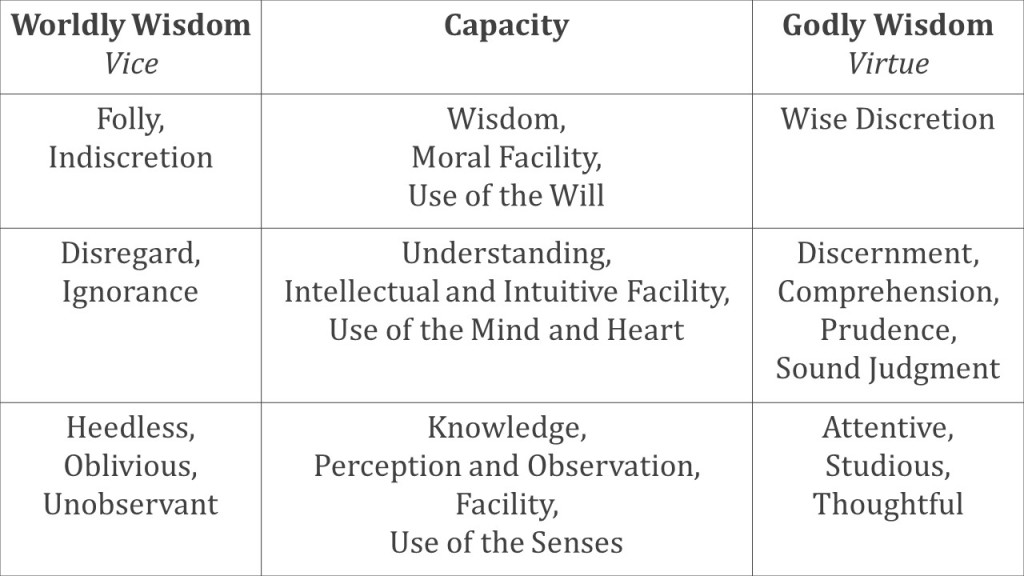Do you really know what wisdom is?
 For example, sometimes we speak of “worldy wisdom,” as in, “There’s a real debonair fellow. That guy has lots of worldy wisdom.” But in Proverbs, worldly wisdom means human wisdom that sets itself up in contrast with God’s wisdom.
For example, sometimes we speak of “worldy wisdom,” as in, “There’s a real debonair fellow. That guy has lots of worldy wisdom.” But in Proverbs, worldly wisdom means human wisdom that sets itself up in contrast with God’s wisdom.
Worldly wisdom is actually an illusion. It’s folly masquerading as wisdom, a stylish display without virtue. There’s no such thing as wisdom apart from God.
Worldly wisdom is an illusion, but its effects are very real. It leads to destruction. It takes the fool to an undesirable destination. Proverbs shows us this again and again.
True wisdom is derived from revelation, God’s self-disclosure in the creation and in the Scripture. In fact, wisdom entails both revelation and reason. Both are necessary elements to true wisdom.
Reason without revelation leads to worldly “wisdom” which ends in impoverishment of soul, intellect, and even cultural life. We see this in entire societies deeply influenced by materialism.
Revelation without reason, on the other hand, leads to anti-intellectualism, at the very least, and social tyranny at worst. This is the product of religions that deny the comprehensiveness, or the authority, of God’s self-disclosure.
Human beings are the creation of God. As such, they are dependent on God for everything, including wisdom. When humans deny God and build their solutions on man, their attempts to answer the basic questions of existence, morality, and beauty end in folly. This is another way to say that worldly wisdom leads to illusion.
An ancient writer put it this way:
If we refuse to admit that we are sinners, we live in a world of illusion. Truth becomes a stranger to us. But if we freely admit that we have sinned, we find God utterly reliable and straightforward – he stands ready to forgive our sins and make us thoroughly clean from all that is evil. For if we take up the attitude ‘we have not sinned,’ we flatly deny God’s diagnosis of our condition and cut ourselves off from what he has to say to us. 1 John 1:9-10 PHILLIPS
What does God say about our condition? We are sinners! We are separated from God by our sin. The person who says “I’m not a sinner” is denying reality, creating a counterfeit reality. Such a person is inventing an illusionary world in their mind.
In June 2004, a company called Linden Labs created Second Life, an online virtual world. A new user creates an avatar to represent himself and interacts with the avatars of other users in this virtual world. The program intentionally promotes the “freedom” of living in a complete illusion.
Second Life has a million active users. One can only imagine the fallout to real-world relationships, the erosion of virtues such as personal responsibility, the hours and hours of wasted time that accompany such folly perpetuated on such a grand scale. (To paraphrase Winston Churchill, “Never has so much been spent by so many to so little effect.”)
Relative to the world’s population, Second Life participants are a tiny group. But many, many people create a less vivid, yet no less dangerous, illusionary world. To deny God or his diagnosis is to create a counterfeit world.
If we want to be wise, if we want to benefit from God’s wisdom, our lives must be framed by revelation and reality
 The table captures the salient points of this discussion. The center column is labelled “Capacity.” Starting in the bottom row, it depicts knowledge, understanding, and wisdom.
The table captures the salient points of this discussion. The center column is labelled “Capacity.” Starting in the bottom row, it depicts knowledge, understanding, and wisdom.
Knowledge relates to information. We use our senses to gain knowledge.
People of godly wisdom (right column) respond to information differently than the “worldly wise” (left column). The former are attentive to the facts; they are thoughtful and studious. They believe that reality is of God, therefore all of it is important.
The foolish (worldly wise) person gives little attention to facts. Such a person is self-focused. Rather than living in awareness of God and His objective reality they orient their world around themselves. As a result, they are less interested in facts and more interested in feelings. If something isn’t fun it has little value. They fail to carefully observe reality. The inevitable result? They bump into the wall of reality.
For example, as very young children we are introduced to gravity. In learning to walk, we fall a lot. We subconsciously adjust our technique and fall less. The same principle applies to other behaviors. Proverbs says “pride goes before a fall.” The wise person heeds that instruction and learns humility. The worldly wise person continues in pride, only to fall in shame over and over, always falling and never learning. This is what we mean by “bumping into the wall of reality” (maybe we should have said “hitting the floor of reality”).
Moving up one row in the table we come to the level of understanding. This is the use of our intellect, mind, and intuition. We use our intuition and our reason to understand the knowledge we have. We ask questions like, What do these facts mean? What do they suggest for the individual? For the community?
Years ago Christ Hospital in Chicago was performing late-term abortions. If the infant survived, the baby was laid in a dirty utility room and allowed to die. In 1999, nurse Jill Stanek discovered this horror and blew the whistle. Two years later, the Illinois state legislature wrote a law prohibiting this action. The law made the hospital responsible to save the life of a baby who had survived an abortion. But the law did not pass. A young state senator single-handedly intervened to stop it. His name was Barack Obama. In 2016 he is finishing his second term as president of the USA.
Were Americans wise or foolish in electing such a person to serve as president? Did they take into account the facts of the abortion legislation? No, they voted their emotion. This is an example of what can happen when people choose to be oblivious to reality.
A fool disregards the evidence. He makes decisions without regard to reality. A godly person will be discerning. They will weigh the evidence and will make a sound judgment in relationship to the evidence.
Finally, the top row brings us to wisdom, the moral faculty. In this area we exercise our will. Wisdom lies not in the intellectual arena; it is a moral reality. Wisdom is simply the moral application of truth. Thus, a wise person will show discretion in their decisions. The foolish person will decide either without understanding or will intentionally violate their understanding: “I know this is right but I’m going to do that.”
How important that we cultivate wisdom in our lives.
- From a forthcoming book by Darrow Miller and Gary Brumbelow







